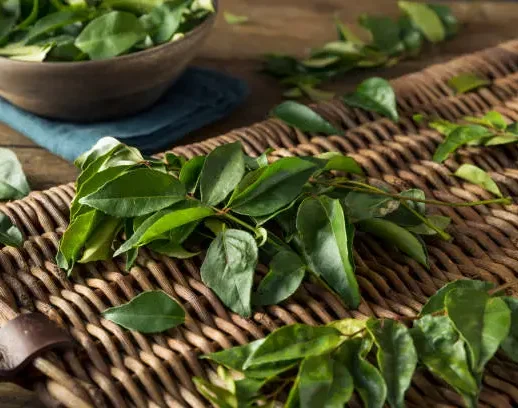Curry leaves, the aromatic leaves of the curry tree, are a staple ingredient in South Asian cuisine. They add a unique, citrusy, and slightly peppery flavor to curries, dals, and other dishes. Unlike curry powder, curry leaves don’t lose their flavor when dried, making them versatile for various culinary uses. Beyond their culinary significance, curry leaves hold cultural importance in India, often associated with auspicious occasions and religious ceremonies. Tradition ally, curry leaves were believed to possess medicinal properties and used in home remedies for digestive issues and wound healing. Modern research explores their potential benefits for blood sugar control, inflammation reduction, and even cancer prevention. Curry leaves are rich in antioxidants and essential oils, contributing to their potential health-promoting properties. While generally safe, excessive consumption of curry leaves might cause stomach upset in some individuals. Sustainable sourcing practices are crucial to protect the curry tree and ensure fair trade for farmers. Look for fresh, green, and fragrant curry leaves for the best flavor and experience the unique taste of India in your cooking.
Benefits:
- Antioxidant activity: Rich in antioxidants like vitamin C and flavonoids, protecting against cell damage.
- Anti-inflammatory properties: May help reduce inflammation associated with various conditions.
- Blood sugar control: Early research suggests potential benefits for managing blood sugar levels.
- Digestive health: Traditionally used to aid digestion and alleviate bloating.
- Wound healing: Traditional use for wound healing requires further scientific validation.
Botanical Description:
- Evergreen tree reaching up to 6 meters in height.
- Glossy, pinnate leaves with 5-11 leaflets, emitting a citrusy aroma when crushed.
- Small, white flowers with a strong fragrance blooming in clusters.
- Small, black berries containing single seeds.
- The aromatic leaves are the prized culinary ingredient.
Chemical Constituents:
- Essential oils: Limonene, α-pinene, and other compounds contributing to the characteristic aroma and flavor.
- Flavonoids: Quercetin, rutin, and other antioxidants with potential health benefits.
- Alkaloids: Murrayanine and koenine, with limited research on their effects.
Disclaimer: This information is intended for educational purposes only and should not be construed as medical advice. Always consult a healthcare professional before using curry leaves for medicinal purposes, especially if you have pre-existing health conditions or are taking medications.

